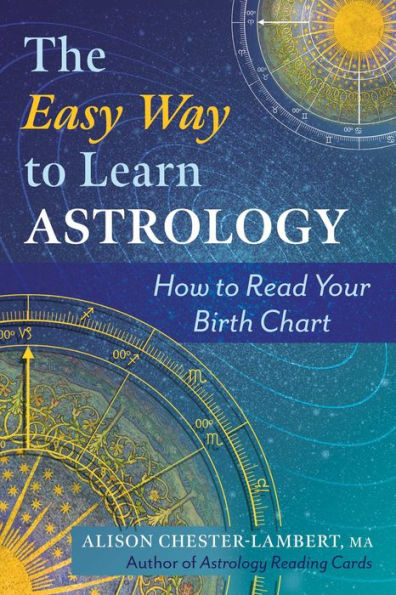The problem with designing a product to be user-friendly, be it a book or a bowling ball, is that bringing that design philosophy to the attention of buyers looks exactly the same, regardless of whether it's a good-faith effort to provide a service or a nefarious deception. Advertisements for the Noah's Ark Experience look the same as the ones for Disneyland. And so, yours truly approached The Easy Way to Learn Astrology: How to Read Your Birth Chart with healthy skepticism. The author, Alison Chester-Lambert, MA has an extensive CV with a focus on communicating her knowledge in the pop-culture vernacular; the perfect person for the job, whichever way it turns out.
Antenna up, I dug in.
The result is mixed. My worst suspicions are unfounded, and I offer up my apology. Chester-Lambert seems to know the subject well - better than me at least! - and presents her work in a truly accessible way. This is clearly something she works hard at and is justifiably proud of; the preface of the book lays out in explicit terms her disillusionment with the "old-school" of astrological education and the effort she put in to adopting new methods. She is particularly comfortable in setting aside the hand-crafted nature of astrological charts and encourages readers to embrace digital tools that remove the grunt work of preparing astrological readings. The thesis of the book seems quite promising - going straight to the casting of your birth chart, which one might presume would be a jumping-off point for explanatory passages for every step along the way. These things don't always pan out, though. Despite that thesis, the first 100+ pages of the book still provide preparatory instruction in fundamentals of astrology rather than using your birth chart as a practical example. There's also a slippery, ongoing discourse on different types of astrology, of which Chester-Lambert focuses on "psychological astrology". I say it's slippery because in my experience a writer on spiritual or metaphysical subjects who synthesizes their work with "hard" science or psychology risks falling into the trap of cherry-picking the bits of the one that reinforces their view of the other, without really embracing both subjects equally. I don't think our author is up to anything nefarious, but I also don't think anything is gained by conflating zodiac signs 1:1 with psychological concepts.
The Easy Way to Learn Astrology does a couple of things really well. First of all, I appreciate how it clearly explains how the classic "what's your sign" level of understanding astrology is not a terrible notion, merely an incomplete one. The zodiac is grouped first by elemental association rather than chronological progression, a method that I found quite sensible to avoid the reader feeling like they are bounced back and forth as the read. And as I've said, one of the author's strengths is the very approachable way in which she writes on her subject. It's no wonder she was been called upon by various media outlets in the UK through the years when they've wanted to bring up the subject of astrology. All this being said, this is absolutely not a "necessary" book for your library if you've already got any sort of grounding at all in astrology. There are introductory texts in this world that can always stay on your shelf, holding insights that you can return to throughout the years no matter how far you progress. This book is firmly set-up to be an introduction from which you will proceed. If that's where you are with astrology, it's a fine choice.
~review by Wanderer
Author: Alison Chester-Lambert, MA
Findhorn Press, 2024
176 pages, $16.99

